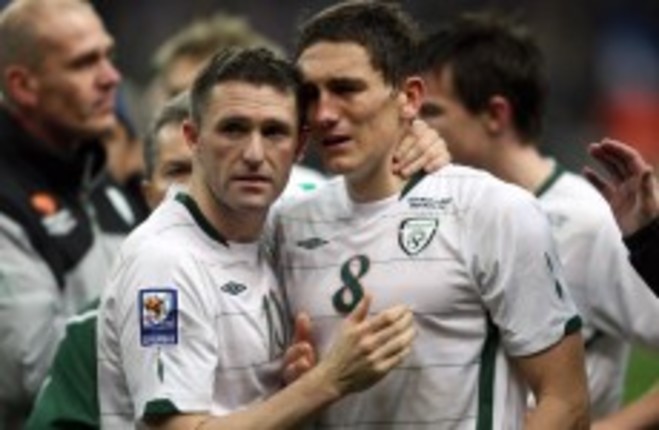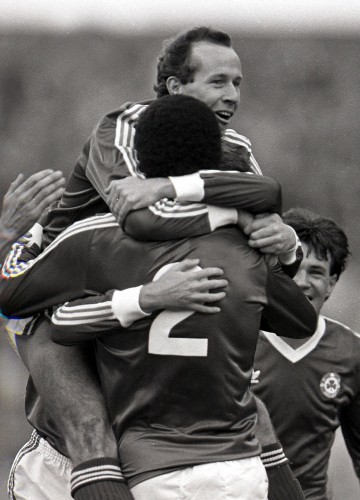IN SELECTED EXTRACTS from his book “Stuttgart to Saipan: the players’ stories”, Miguel Delaney talks to the Irish players about play-offs past.
France, 2010 World Cup
That Liam Brady never got to play in a tournament befitting his talent doesn’t necessarily bother him. But some of the reasons do.
Brady has been involved in five very questionable refereeing controversies during his time with Ireland, four as a player, three in Paris.
Sitting in the Merrion Hotel about to analyse the 2010 World Cup for RTE and with the passage to it that Thierry Henry literally handed to France so fresh in the memory, Brady is convinced they’re all part of the same continuum. Some incidents overt, some covert. All effectively conditioned to ensure the little guy loses out.
Does he actually believe there were outright conspiracies when he was a player though?
“Oh yeah. Without any doubt. We didn’t have anything going for us as far as Fifa were concerned. We were really just also-rans as far as they were concerned and in referees’ eyes as well – that referees could do things to us and there’d be no repercussions.
“Whereas, if it was England or a bigger nation there’d be such an outcry or maybe investigations they wouldn’t take that chance. But with us it happened. No doubt about that… Certainly now, looking back I feel very strong that there was a lot of skulduggery going on.”
The first example Brady cites came in his second campaign as an international and John Giles’s as manager. Despite just missing out on Euro 76 by a point, the team had picked up momentum. “Under John performances had been better, got a few results. We went into that qualifying campaign with confidence. He was that kind of manager, said ‘look, we’ll play this kind of game, believe in ourselves and be confident and we’ll get good results. And he was right up to a point.”
To the point of the referee’s whistle. For Argentina ’78, Ireland were drawn in a tough three-team group alongside France and Bulgaria but weren’t exactly put off by an opening trip to Paris. Not even by Michel Platini’s opener. Even then, they should have had the goal that gave at least a point.
“We lost under circumstances that were strange to say the least. We again got another good goal. I put a cross in, Gerry Daly pulled the ball back and Frank Stapleton knocked it in. For some reason, the linesman flagged for offside. We saw on television afterwards that it was ridiculous.”
St Etienne’s Dominique Bathenay then added injury to insult with a late scarcely deserved clincher which, as Brady says, “kind of deflated the team”. But didn’t completely blow them away. Giles’s side recovered admirably in the return to claim an excellently executed 1-0 win and winner – Brady illustrating his increasing ability by chipping between two French defenders then racing clear to finish calmly.
Forget Paris
The team recovered from another setback in Sofia when Don Givens equalised Pavel Panov’s opener for Bulgaria and Ireland looked assured of claiming the win there that had eluded France and would have put them top of the group with only a game left. The pressure was beginning to tell. But not just on the Bulgarians. Also the officials.
Givens was denied a penalty and then Giles himself had a goal disallowed for another inconceivable offside ruling. Andrej Zhelaskov then scored 14 minutes from the end on the break before getting sent off along with Krasmir Borisov, Mick Martin and Noel Campbell for a brawl. As Paddy Mulligan bitterly remarked, it was “possibly because they had red hair… it left a terrible feeling in the stomach”.
France went on to Argentina, Ireland to agitate over what might have been. But what was to come was going to be even harder to stomach. The 1982 World Cup qualifiers brought another trip to Paris, another undeserved 2-0 defeat, another controversy but, incredibly, only a hint of that which was to follow.
“That was another episode,” Brady laments. “We had beaten Cyprus, beaten Holland and drawn at home 1-1 with Belgium, didn’t do any damage there. That France away game would have been a big result for us though, would have tipped the group in our favour. We would have had the referee been anyway fair. But, 1-0 down, Kevin Moran scores a legitimate goal. Robbed there again. Absolutely robbed.”
Still though, Ireland were in an exceptionally strong position. Cyprus were seen off 6-0 and qualification really was in clear sight. It might finally, actually happen. Ireland in a major championship.
A point in the next game in Belgium could have done it. In fact, a point in Belgium absolutely would have done it. The way Ireland played that night they deserved much more. What they certainly didn’t deserve was a sensational series of incidents that made the entire Henry hullabaloo look like no more than, literally, a simple sleight of hand.
Lightning and relentless rain almost caused the match to be abandoned. Perhaps it should have been given what followed. Nevertheless, the real action started just before half-time. Ireland were awarded a free-kick on the right. Brady flicked it on, Stapleton had finished. It was a move that had come off multiple times at Highbury. What hadn’t, however, was a referee’s whistle signalling anything other than a goal.
Paul McGrath celebrates his goal against Bulgaria with Liam Brady and Ray Houghton. INPHO/Billy Stickland
“Frank and I had a relationship having grown up at Arsenal and knew each other very well,” Brady now explains, an element of irritation rising in his voice. “With a free-kick I would wait for Frank to walk a yard like he wasn’t interested, then he was going to come back and I just put it in where he was going to arrive. I knew he was onside because we knew each other so well he would never be offside.”
The linesman apparently didn’t think so either. As Brady says “there was a lull”. Referee Raul Nazare then disallows the goal before, a full three seconds later, the linesman guiltily puts his flag up.
“In hindsight, they must have all agreed, the officials, that if it was anything like that you flag for offside.”
If that was the case then they never agreed on an official version of events. When interviewed by the Sunday Tribune in 2002, 21 years after the game, referee Nazare first confidently asserted to Paul Howard that “Frank Stapleton was offside. I remember this very clearly. It was not really my decision, you see. It was the linesman who gave me the indication… In fact, I remember now that I had blown the whistle before Stapleton touched the ball. So technically, you see, I did not disallow the goal because there was no goal to disallow.”
Yet, when presented with irrefutable evidence of the opposite – Howard asking him to watch Eoin Hand’s personal videotape of the game – he desperately backtracked and scrambled for other explanations.
First: “I made a mistake when I told you it was offside. I awarded an indirect free-kick. Nobody touches the ball before it goes in.” Then, when even his daughter disputes this version: “The ball hits me and not Stapleton. That is why I disallowed it.” This despite the fact he is four feet from the ball when Stapleton blatantly volleys it into the net.”
And still, it gets worse. Three minutes from the end of the game but only inches from the spot where Brady hit that initial “indirect” free-kick, Belgian captain Eric Gerets goes down a good foot away from the nearest Irishman and lands on the ground even further away from where he left it. Again, Nazare gives an inventive interpretation. “Yes he is clowning, there is no doubt, but there is some physical contact with this player, Steve Heighway.” There isn’t. There is contact between the ball and the net though when Rene Vandereycken’s subsequent free bounces off the bar and high into the air only for Jan Ceulemans to react first and decisively.
Belgium got the win that ultimately took them to the World Cup. Nazare got a lot of abuse. First Mickey Walsh, familiar with the Portuguese Nazare from his time at FC Porto, called him a “cheat”. Hand went further.
“You’re a disgrace. You’ve been paid off. You’ve robbed us.” Brady, meanwhile, asked Walsh the Portuguese for thief and put it to Nazare’s face along with an accusatory jabbing finger. Was that real rage, or actual restraint?
“Well you can very nearly get banned totally from football when the likes of that happen. You’d have to stop yourself attacking the referee coming off the pitch. The sense of anger is, well… but it was really, really diabolical. I have a theory Fifa would prefer some teams to get to World Cups because of major sponsorships or money. And well it all came out that Belgium was corrupt. They were exposed as a totally corrupt federation and also at club level. Anderlecht had a title taken off them, there was the Uefa Cup game against Notts Forest. I reckon we were done in France and Belgium we were hijacked. And then to lose out on goal difference shows we were good enough to qualify and that was probably the best group of players until the one Jack got.”
And, yet, there was more.
“The Henry thing was one of the worst incidents in my footballing life. We didn’t say it to the players before the game but I always had a feeling… people wanted France there.
“I think Fifa were paving the way for this to happen. The changing of the draw exposed them totally to what they’re all about. If it had been Serbia finishing second in their group they would never have seeded that draw and that exposed them totally to what Blatter and France are about. It conditions the officials.”


